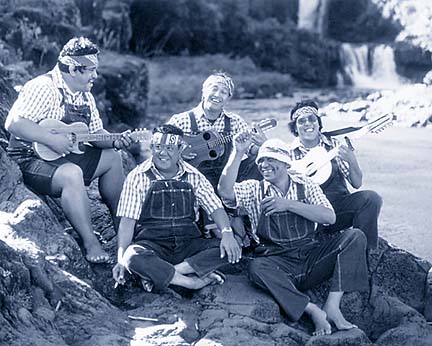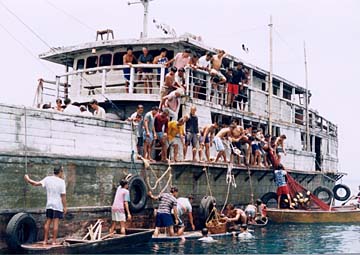Advertisement - Click to support our sponsors.

HAWAII INTERNATIONAL FILM FESTIVAL

Although Eddie and Myrna Kamae have been making films for a dozen years now, thoughtfully harvesting the same fields of cultural continuity and hands-on preservation, "Sons of Hawaii" is the film we've been waiting for them to make. ‘Sons of Hawaii’ an
epic masterpieceBy Burl Burlingame
Star-BulletinAfter all, Eddie Kamae is a founding member of Hawaiian music's first "supergroup," an ukulele wizard who met guitarist and born entertainer Gabby Pahinui on a Waimanalo beach in 1959. The sparks struck at that moment helped light the Hawaiian "renaissance" of the 1970s, spearheaded by the performing arts.
Kamae and Pahinui teamed up with bassist Joe Marshall and steel guitarist David "Feet" Rogers, also respected musicians. They began playing Hawaiian music in the "real old style," a sound that grew organically from back-yard luaus instead of being passed down through Waikiki tourist shows.
Although the group was a hit from the first, one of the first stumbling blocks was that none of the members spoke Hawaiian. Kamae sought the advice of Mary Kawena Pukui, legendary Bishop Museum master of the Hawaiian language, and this started him on his life's parallel journey along with music; a consuming scholarship of all things Hawaiian, and more importantly, a student of the process by which such knowledge is transmitted between generations -- or not transmitted.
All of the Kamaes' films have dealt with this dilemma to some extent. What sets "Sons of Hawaii" apart is not only the depth of the subject matter -- at 80 minutes, it might be considered their epic masterpiece -- but the resonance it strikes with every level of modern Hawaiian culture.
The Sons' deliberately low-key performing style was aimed at the common man, and the sheer musicality and verve of their talent elevated the music to the center ring.
The Sons of Hawaii became a revolving door of Hawaiian talent, Kamae himself being the only constant member. All surviving members are interviewed. Those who are no longer with us -- like Pahinui and Rogers -- are discussed at length. Each member's obvious pride at being a Sons alumnus is evident.
"Sons of Hawaii" is a highly professional journey in roughly chronological order, put together by Kamae's usual stable of talent -- photographer/co-producer Rodney A. Ohtani, writer James D. Houston, narrator Ka'upena Wong, editors Robert Oshita, Stanford Chang and Ross Okamura.
"Sons of Hawaii" premieres at 6 and 8:30 tomorrow in Hawai'i Convention Center's Theater 310. Each show is preceded by live music by Eddie Kamae and the Sons of Hawai'i, beginning at 5 p.m. Tickets for the first show are sold out, so space will be available only in the case of no-shows, but tickets are left for the later showing. Information: 946-7055. Premiere showing
Neighbor Island showings are at 6:30 p.m. Nov. 14 at Kauai Community College; 6 and 8:30 p.m. Nov. 15 at McCoy Theater on Maui; 6 p.m. Nov. 18 at the Palace Theater in Hilo.
Sponsors include the Queen Emma Foundation, Movie Museum, First Hawaiian Bank and Grace Pacific Corp.
Star-Bulletin

Fishing stories get out of hand sometimes, and turn into real whoppers. "Moby Dick," for example. "Muro Ami," for another. While this new film from the Philippines doesn't compare even remotely to Melville's classic, it has many of the same elements, with a dash of Joseph Conrad for seasoning. Muro Ami a predictable fish tale
By Burl Burlingame
Star-BulletinFredo is the hard-bitten -- the guy appears to be chewing sawdust and leaving a trail of 2-by-4s through the film -- skipper of a fishing craft named after his dead wife. He had a little boy too, and maybe named the dinghy after him. The family perished in some sort of undefined accident; "the sea" gets the blame.
Fredo is known as "Maestro" for his uncanny fishing ability and his hard-driving corporate management style, which is to scream at everyone and grit his teeth as if he's grinding wheat. Really, get the guy a laxative.
Muro Ami (Reef Hunters)
Shown with "Anino" at 7:30 p.m. Thursday, Waikiki 1; at 3:30 p.m. Friday, UH Campus Center Ballroom
Fredo is played by Cesar Montano, a big movie star in the Philippines, though not big enough to be elected president. The guy is one big knotted muscle.
The fishing technique is largely unique to the Philippines and is called "Muro Ami," or reef hunters, with hundreds of kids swimming in a cavalry formation, yoyo-ing rocks on strings up and down on the reef, driving fish before them into the nets. They all live in dreadful, concentration-camp dormitories aboard the ship, which is alarmingly ramshackle. So what we've got here is also quite "Oliver Twist."
Fredo gets fruitier as the film grinds on, and sure enough, he's nursing a massive shark bite he doesn't want anyone to know about, except that every few frames he goggles in pain, clamps down like a nutcracker, clutches his side and staggers into the bulkhead.
Can you guess what occurs next? Crazy demands. Nowhere to run. Uncharted waters. Recalcitrant machinery. Mutiny. Death. Bathing. Pretty sunrise.
"Muro Ami" is directed by Marilou Diaz-Abaya with a keen eye toward lovely photography and a tin ear for plot development. Everything is telegraphed about a reel in advance. Instead of an unfolding, classic tragedy that reeks of cruel fate, out of our hands, the film has the bedeviling but slight inevitability of an overdue homework assignment.
Hawaii International Film Festival
This is the third of five Hawai'i International Film Festival Golden Maile nominated feature films that we will be reviewing through Thursday. Winners will be announced Friday.
Click for online
calendars and events.